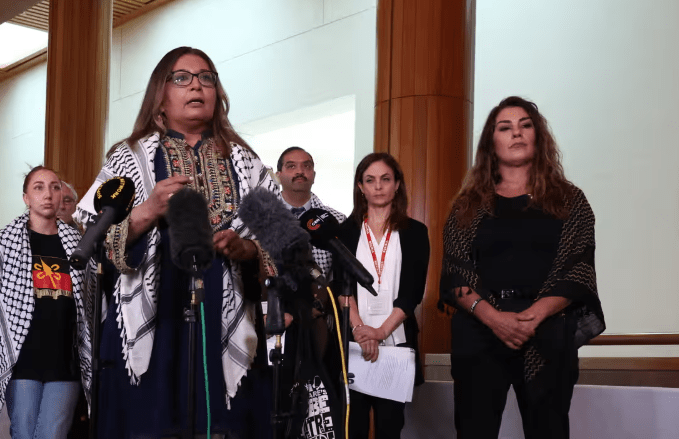Senators Lidia Thorpe and Mehreen Faruqi are calling for a major review of racism and sexism in federal Parliament, arguing that the institution’s rules and culture fall short in addressing harmful behaviour, particularly towards women of colour.
The two senators have co-sponsored a Senate motion asking the procedure committee to investigate whether the chamber’s rules should be updated to “eliminate language, behaviour, decision-making, and practices that are sexist, racist or otherwise exclusionary and discriminatory.”
The motion, inspired by recommendations from the Set the Standard report, also calls for public hearings to prioritise the voices of marginalised groups, including First Nations people and people of colour. The review aims to address systemic issues in Parliament and ensure that it becomes a safer, more inclusive workplace.

This call for reform comes after Thorpe was recently censured for protesting against King Charles III at a parliamentary reception, where she raised issues of colonisation and the monarchy’s impact on First Nations people. It also follows Faruqi’s legal case against One Nation leader Pauline Hanson, in which the Federal Court ordered Hanson to apologise for racially vilifying Faruqi in a social media post. Hanson has refused to comply with the court’s order.
Thorpe and Faruqi have been outspoken about the toxic culture in Parliament, pointing to their own experiences with discrimination and what they see as inconsistent enforcement of standards.
“Racism in the Senate chamber is routine,” Thorpe said. “Senators dogwhistle and demonise people of colour in speeches, and racist sledging and comments have been made towards Senators of colour, myself included.”
Thorpe criticised how Parliament deals with misconduct, citing her removal from a delegation to Fiji and Tuvalu after she spoke out against the monarchy. “It was confronting to see that I was kicked off a parliamentary delegation… while a senator who made appalling racist, homophobic and ableist comments online was dealt a more lenient consequence by the Senate,” she said.
She added, “Discussions of racism might make people uncomfortable, but these are real problems that need to be openly discussed. It’s racist in itself to prevent these issues from being raised in the chamber, or forcing senators to withdraw.”
Faruqi shared similar frustrations, recounting how she was silenced in the Senate for calling out racism and white supremacy. “The Senate refused to censure Senator Hanson for racially vilifying me, but they are quick to shut me down for calling out racism,” she said. “Politicians in here really need a good dose of anti-racism training.”
Reflecting on Parliament’s broader culture, Faruqi said, “If there is any workplace that needs unpacking of white privilege and white fragility, it is this Parliament. Despite all the revelations of the past few years, Parliament still has not reckoned with its whitewashed and exclusionary culture where discrimination against First Nations people, people of colour, people with disability and LGBTQI+ people is common in practice and policy.”
Thorpe expressed concerns about how such a culture discourages young people of colour from entering politics. “For young people of colour wanting to move into politics, the level of racism we see in this workplace is a major barrier and turn off,” she said.
The motion also pushes for greater accountability by recommending a review of standing orders to address the gaps in enforcement and clarify behavioural standards. It calls for the procedure committee to report back by March 2025.
“Parliament is my workplace. Racism is called out in other workplaces, and it should be called out in Parliament too,” Thorpe said.
“This inquiry is about taking a stronger stance on racism and holding this Parliament to a higher standard,” she added. “It aims to ensure that the recommendations of the Jenkins report are being taken into consideration in relation to racism, and that codes of conduct are strengthened.”
Faruqi echoed the urgency of the inquiry. “It’s been three years since the Set the Standard report, two years since the parliamentary behaviour codes were developed and 20 months since they were endorsed by Parliament, but it seems to make no difference to how women of colour are treated in here,” she said.
“The highest office in this country should lead the way on safe and respectful behaviour, but it is far from it,” she added.
Thorpe and Faruqi’s motion represents a significant push for Parliament to address its cultural shortcomings, with hopes that the proposed inquiry will mark a step towards lasting change. Whether their call for reform will gain the necessary support in the Senate remains to be seen.

